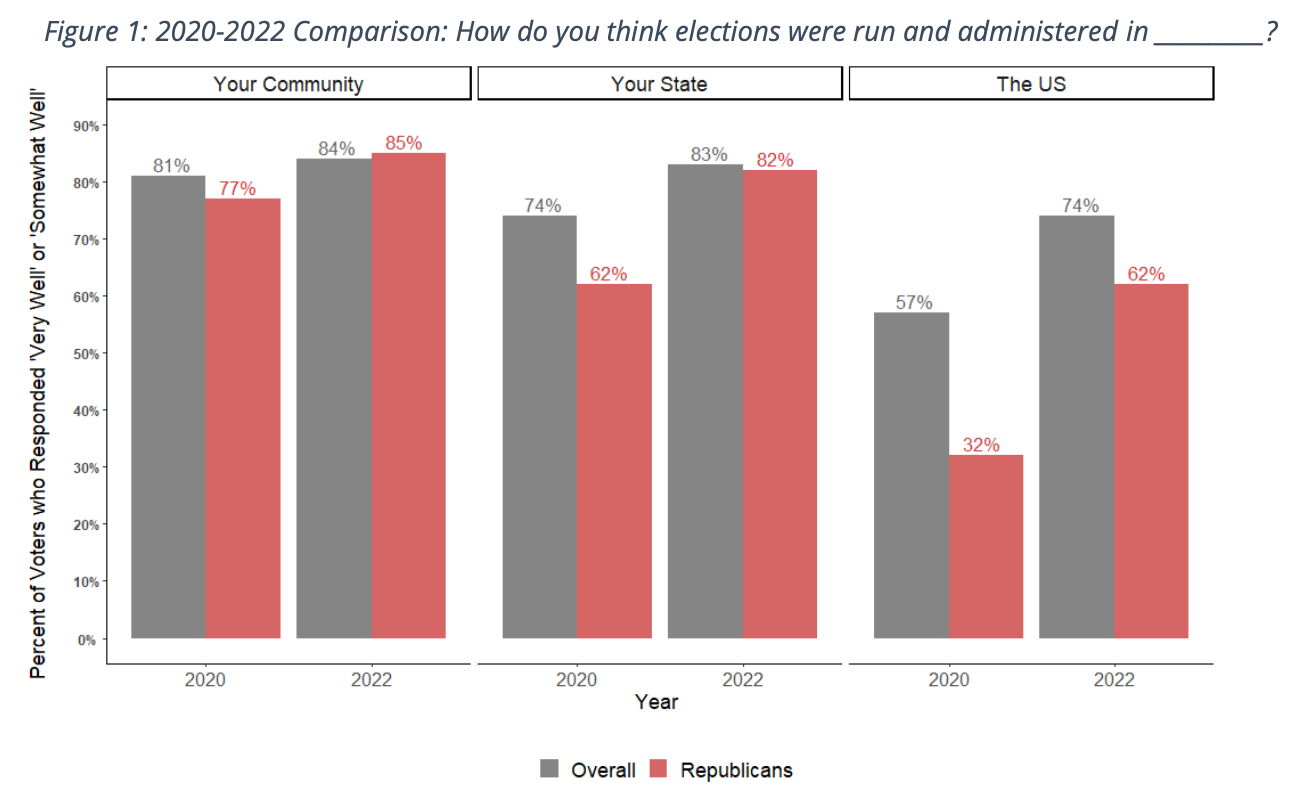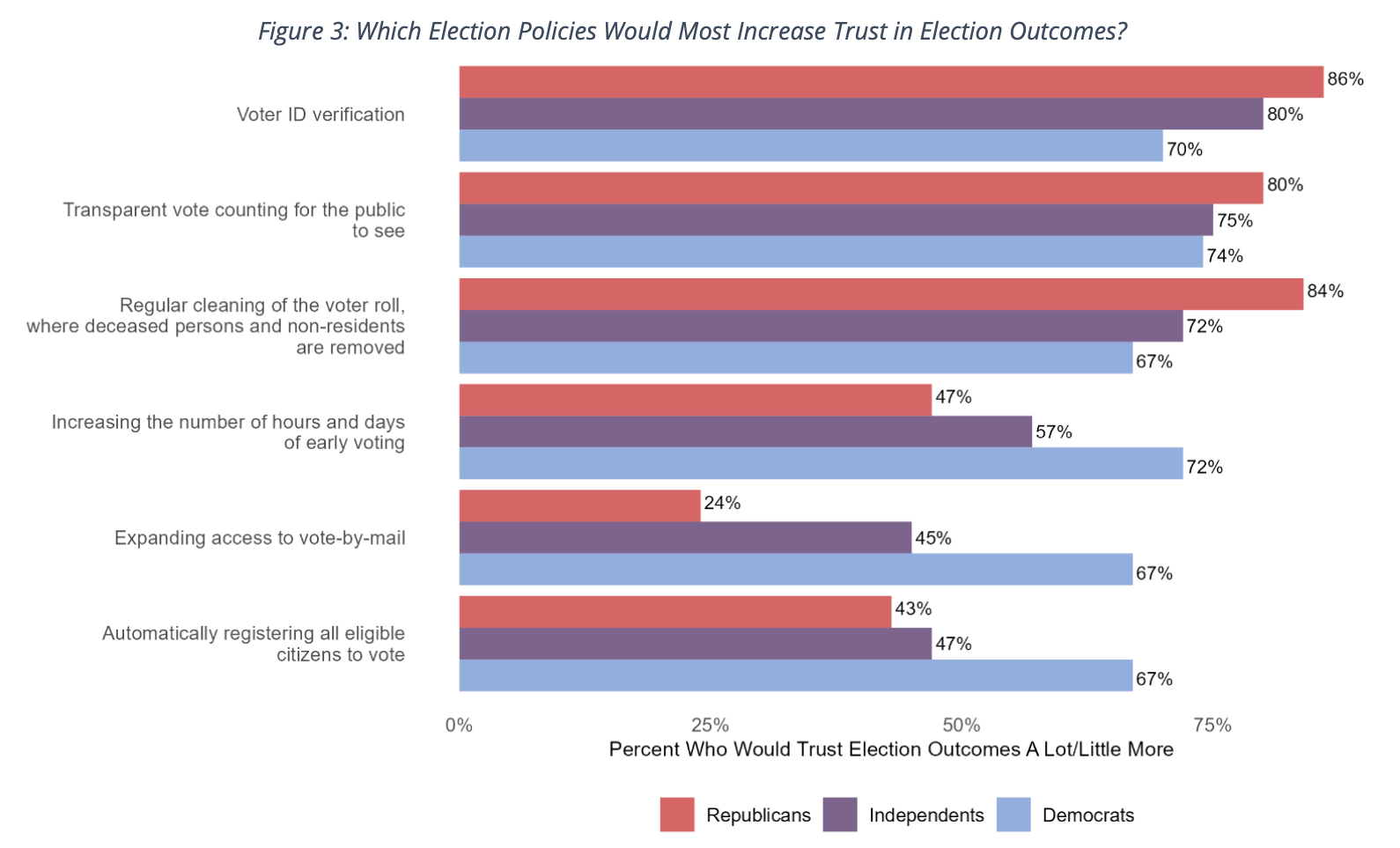Survey of Voter Beliefs about Election Integrity Post-Election 2022
In 2021, The Center for Election Innovation & Research (CEIR) partnered with Echelon Insights to better understand voter confidence and perceptions of election integrity in the wake of the widespread election denial that followed the 2020 election. That survey revealed that Republican voters lacked trust in elections much more than other voters. In December 2022, CEIR once again partnered with Echelon Insights on a survey (N=2,262) to assess voters’ beliefs about election integrity, with a focus on Republicans (GOP). We summarize the survey’s key findings below.
Key Findings
- Confidence in the administration of the 2022 election overall is higher than in the 2020 election, with a marked improvement among GOP voters. Still, perceptions of the 2020 election among GOP voters remain negative, and their confidence in election administration in 2022 lags behind that of other voters.
- Overall, GOP voters continue to report high rates of mistaken beliefs about the administration of elections, including the prevalence of fraud and miscounted votes, especially in states other than their own.
- Voters identified several policies, including voter ID verification and transparent vote counting, as mechanisms that would increase their trust in elections. Importantly, most of these respondents reside in states that already have these policies in place, suggesting that the issue might be one of awareness and possibly reflecting a greater need for investment in voter education over new legislation or policy changes.
- In multiple instances, views among GOP voters who did not vote for Trump in 2020 are more closely aligned with independents and Democrats than with other members of their party.
Confidence in Election Administration and Results
Republicans are substantially more confident in the administration of the 2022 election than they were in the administration of the 2020 election. However, Republican confidence is lower than that of other groups, and their low opinion of the 2020 election is relatively unchanged from 2021.
- When asked about the 2022 midterm election, Republicans, independents, and Democrats are all more likely to say that it was run and administered well at each level than they were when asked about the 2020 general election in the 2021 survey.
- GOP voters, who reported distinctly low opinions of the 2020 general election in the 2021 survey, are now more in line with independents and Democrats when asked to consider how the 2022 midterm election was run and administered in their community and state. Regarding nationwide administration, Republican confidence in the 2022 election is nearly double that of the 2020 election but still lags that of voters overall. Notably, for both elections, Republicans who did not vote for Trump in 2020 report confidence levels more in line with independents and Democrats than with other Republicans.
- Views among Republican voters in oversampled states align with Republicans overall when asked how well the 2022 midterm election was administered nationwide. However, when asked about the administration of the election in their state, significantly fewer Republican voters in Arizona (56%), Michigan (67%), and Pennsylvania (65%) expressed confidence than Republicans overall (82%). On the other hand, more Republican voters in Florida expressed confidence at each level of election administration (94% in their community, 93% in their state, and 73% nationally) than Republicans overall (85%, 82%, and 62%, respectively).
- Nationwide, 30% of all voters believe that election officials in their own state accidentally miscount votes somewhat or very often. Among Republicans, 36% of all GOP voters think the same, with higher percentages among Republican voters in Michigan (51%) and Pennsylvania (51%).
- Despite a general improvement in perceptions of election administration relative to the 2021 survey, perceptions of the 2020 general election in particular remain largely unchanged among all voters, including Republicans, independents, and Democrats.
Perceptions about Voting and Election Fraud
Despite signs of increased confidence in election administration among Republican voters, some lingering beliefs about voting and election fraud persist, even after the success of the 2022 midterm elections. This is especially true when asked about “elections in other states.”
- When asked about elections in states other than their own, a majority of Republican voters (54%) say they think that non-U.S. citizens vote in federal elections very or somewhat often. Similarly, 51% of Republicans say they think people submit too many ballots in drop boxes either very or somewhat often. In both instances, only about one-third of independents (35% and 36%) and one- fourth of Democrats (26% and 25%) say they think the same. Responses among Republicans who did not vote for Trump in 2020 (34% and 26%) are more closely aligned with independents and Democrats.
- Forty-eight percent of Republicans, 32% of independents, and 23% of Democrats say they think people vote more than once in elections in other states very or somewhat often. Similarly, when asked how often they think voting machines or computers miscount votes in elections in other states, 46% of Republicans, 31% of independents, and 25% of Democrats say very or somewhat often.
- Looking ahead to 2024, we see a slight loosening in some of these beliefs among Republicans.
- Overall, beliefs about fraud appear less deeply rooted when voters consider elections held in their own state, with certain exceptions. For example, asked how often voting machines or computers miscount votes in elections in their own state, 29% of all voters and 37% of all Republicans say very or somewhat often. However, the percentage of GOP voters who say the same is higher in Arizona (52%), Michigan (52%), and Nevada (54%).
- Despite no evidence to suggest that illegal or fraudulent voting is a widespread issue, 50% of all respondents say that current rules around voting “are not strict enough to prevent illegal votes from being cast,” while 29% respond that rules “make it too difficult for eligible citizens to cast a ballot.” Democrats’ belief that voting rules are not strict enough increased from 24% of respondents in 2021 to 30% in 2022; however, this number remains significantly lower than the 75% of Republicans who believe the same in 2022. Notably, this percentage is lower among Republicans who did not vote for Trump in 2020, with 50% agreeing that current rules are not strict enough to prevent illegal votes.
Beliefs About Policies to Improve Trust in Election Outcomes
While their trust in elections remains relatively low, Republican voters indicate that certain policies would help increase their confidence. However, many of these policies are already in place in the states where these voters reside, suggesting that voter education to raise awareness may be necessary to inform voters.
- Voters most frequently point to voter ID verification (77%) as a policy that would improve their trust in election outcomes, followed by transparent public vote counting (76%), and regular cleaning of voter rolls, where deceased persons and non-residents are removed (73%).
- Some policies have pronounced differences in partisan support. Notably, 67% of Democrats say expanding access to vote-by-mail would improve their trust in election outcomes—significantly more than the 24% of Republicans who say the same. Similarly, far more Democrats than Republicans believe expanding early voting (72% vs. 47%) and automatic voter registration (67% vs. 43%) would improve their trust in elections.
- There is a general consensus among Republicans with respect to which policies would increase trust in elections. However, there is some disagreement about the impact of vote-by-mail on trust, with 67% of Trump voters saying restricting access to vote-by-mail would increase their trust in elections compared to 40% of non-Trump GOP voters.
- Interestingly, in one way or another, most states have already implemented the policies that the largest number of voters—and a majority of Republicans—say would improve their trust in elections. For example, 35 states have a voter ID law, and all states verify the identity of voters who cast a ballot.[1] Similarly, federal law requires all states to conduct voter list maintenance in part by removing ineligible voters, such as deceased persons.[2] Finally, most states allow the public to view parts of the election process, including vote counting.[3]
About the Poll
The poll was conducted online from December 4-9, 2022. It surveyed 2,262 registered voters nationally with oversamples across six states of interest: AZ (oversample of 157), FL (159), GA (152), MI (158), NV (154), and PA (160). Additionally, Republicans were oversampled nationally by 304 respondents. Survey analyses follow best practices concerning statistical consideration of minimum sample sizes. The survey sample has been weighted to national characteristics related to gender, age, race/ethnicity, education, region, party, 2020 presidential vote, and 2022 U.S. House vote. State oversamples are similarly weighted. Importantly, using national weights for analysis of state-level trends introduces correspondingly greater margins of error. This poll has a total sampling error of +/-3.1%.
Click here to learn more about how we defined our universes for this report and to download the crosstabs.
[1] “Voter ID Laws,” National Conference of State Legislatures, October 28, 2022. https://www.ncsl.org/research/elections- and-campaigns/voter-id.aspx
[2] 52 USC § 21083(a)(2)
[3] “Policies for Election Observers,” National Conference of State Legislatures, November 7, 2022. https://www.ncsl.org/research/elections-and-campaigns/policies-for-election-observers.aspx


